The Path to Launching a Million-Dollar Store
Finding success with your very first ecommerce store is unheard of.
Cole Turner is no exception.
After his initial and multiple failures, Cole was forced to lie to his family about giving up dropshipping. But in reality, he powered on and is reaping the success of this perseverance.
His latest store, launched a year ago, has brought him $1.6 million in sales to date.
Cole joins us today to share with us valuable information about running a business. If what you're looking for is ecommerce tips and insights, you'll want to tune in for this one.
If you're short on time, we've got you covered. Here's a five-point TL;DR version:
1. According to Cole, having a real brand identity and showing that you're a legitimate business is the only way to be succesful in dropshipping nowadays.
2. Customer service is the most important part of his businesses because it drives customer retention, positive reviews, word-of-mouth sales, etc.
3. If you can get good enough at Facebook ads yourself, no other agency will be able to do it as well as you.
4. The biggest challenge about running a business is your own mind and persevering through the tough times.
5. A business is a money multiplier. If you give it money and it runs correctly, it gives you more money back.
Start Yours is a podcast about ecommerce, dropshipping, and all things launching a business.
Join us as we meet entrepreneurs who have gone through the triumphs and headaches of running an online store, and learn how they managed to survive and thrive.

Don’t wait for someone else to do it. Hire yourself and start calling the shots.
Get Started FreeFrom Losing Money To $1.6 Million in Sales
Cole: I'm about to be 22 in a month, a little less than a month. But I'm 21 right now. When I was 18, one of my best friends named George, I messaged him because he was always very entrepreneurial-minded, and at the time I wasn't. I was just a regular college student.
So it was over Christmas break, and I said, "Hey, what are you up to, buddy? What are you working on these days?" And he said, "Oh, well, I'm actually projecting to hit a million dollars this year."
Allanah: Wow.
Cole: And when I was 18, I was like, "That's impossible." I was like, "No way anybody I know could make a million dollars." And then he sent me a video of this guy named Vince Wang who lives in LA and he's been dropshipping, and I talked to him a little bit about dropshipping.
And then long story short, I started a store trying to sell some plants, or some pottery or something, and it didn't work.
And then I kept learning, I kept researching, I YouTubed, I Googled, I did everything, and I ended up losing like $5,000 on Facebook ads.
Basically, Facebook ads can get expensive, and I kept pushing and kept trying. And then eventually I was at the point where I was lying to my entire family and then told them I had stopped trying to dropship because I had lost all my money.
And then I eventually found a product that had become a hot seller for me. And this was on a different store, it was on a general store type deal, and it was a ring, a piece of a woman's jewelry ring. And I ended up selling like $75,000 of that in sales.
Allanah: Wow.
Cole: And then from there, I started a jewelry business that ended up doing $700,000 in sales, I believe. That's when I finally... I had learned a lot about marketing, I had learned a lot about what works and what doesn't, I had taken a lot of courses.
Basically, my repertoire of knowledge at that point was vast. I was an expert-level marketer at that point and then an expert on Shopify as well. Like what Shopify themes convert, what I need to do, what prices I need. So at that point, I had basically mastered it because this is about two years down the line, I was about 20 then.
And then I was sitting there one day and realized that I wanted to start a new brand, and then I thought to myself, what is something that could apply to everyone? And so I started running some ads for it on Facebook and I was very, very profitable.
And then, long story short, I've managed to keep the store alive and I think, as of today, we've done about $1.5 or $1.6 million in sales since last year this time. I think it's been about a year since I started it.

Scaling His Stores
Allanah: That's insane. And so, could you walk me through a little bit about how you began to scale your stores?
Cole: Okay. So for scaling, so I advertise primarily on Facebook. So I always will start out by testing an audience that's relevant to whatever I think my target audience would be. So in the beginning I have to identify who I think would wanna buy my products.
So for me, I thought it would either be college students or it would be people interested in hippie, boho-type hippie stuff. So I ran some Facebook ads targeting college students and then I ran some Facebook ads targeting hippie people.
So the hippie people took, but the college students didn't. So I would scale up on Facebook. So on Facebook, you just increase your budget on the different types of people you target. And then I would go on Shopify, and all of my ads lead to the homepage so that people can go buy what they want.
And that's why I have orders sometimes that are like five and six hundred dollars because they go to the homepage and not the products page. And then from there, it was a matter of on-site optimization, finding out, per month, what are my best sellers and what are my worst ones, and then replacing the worst ones with new ones, and then moving the bestseller up to the front of the collection pages.
And then from there, I would scale with email marketing, I would scale with SMS retargeting, Facebook retargeting, Google, I've been meaning to get into Pinterest, but... It's very difficult to describe how I scale because it's not just typical dropshipping stuff, it's like...
I'm basically trying to create this into a real, real sustainable business, so I'm trying to scale across multiple channels of traffic drivers.
Having a Business Identity and Good Customer Service
Allanah: I did notice that on your website you've got a phone number to call, it has opening hours, you say what time zone you're in, and it feels like a bit more of a brand and a business rather than your standard dropshipping store.
Cole: Yeah, I realized that it's important to give a business an identity. That's what I realized a lot of these people coming out of the gate, that's where they fail because if you look, they just start off and throw the Brooklyn theme on there and just have fidget spinners and stuff and that. It's so clearly see-through.
But the only way to be successful in dropshipping nowadays is to have a real identity as a brand and have a real legitimate business. Even if it's not legit to start with, like you're still shipping from AliExpress, you still have to be believable. People have to trust you.
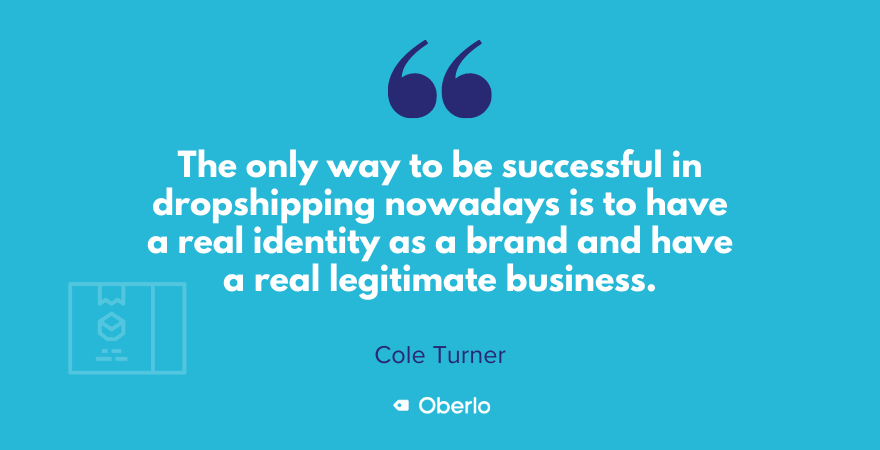
Allanah: To start with, did you make any of the typical mistakes, or what was something that you think you did in the beginning that you really quickly learned or you eventually learned was not the way to do it?
Cole: In the beginning, I told my first employee to say no refunds to everybody on customer service. And then I quickly realized that was a mistake.
So then I eventually realized that customer service is the most important part of the business.
Actually, my girlfriend, she works for customer service, she answers all my emails and the turnaround for her, is she answers them all within like 30 minutes of them showing up.
Allanah: Yeah. Is your girlfriend named Morgan?
Cole: Yeah. She is, Morgan.
Allanah: Yeah. She's really fast at answering the emails. I was impressed.
Cole: She is. And so my customer service… That sends shock waves through your whole business if it's good 'cause then you get return customers, you get positive reviews on Facebook, you get word-of-mouth sales, all of those things.
So I realized that having good customer service is a mistake a lot of people go and make at the start. You should have that in place from the very beginning of your business opening.
Losing Money Outsourcing Facebook Ads
Allanah: Yeah, I think that's great advice. And going back into how you advertise, I know now you have a really wide scope of the different platforms that you advertise on, even if Facebook is the biggest driver. Did you do all the ads yourself, or did you have someone you paid to do that from the start?
Cole: That's a fun story. So I started out running them all myself. I ran them all myself up until August of 2019, I decided to try to partner with an agency. And then I realized, after them losing me money for three months, that that agency was not as good at running Facebook ads as I am.
Allanah: Wow.
Cole: And so I decided to sign up with a contract with another agency that I won't disclose, that entered me into a six-month contract at $5,000 per month. They also were not nearly as good at running Facebook ads as I am, and I paid them $20,000 and they lost me like $10,000 in ad-spend, so I lost $30,000 with them.
And so the moral of the story is that if you can get good enough at Facebook ads yourself, any agency is not gonna be able to run ads as well as you. Because I realized agencies, ad agencies, are best for people who know nothing about advertising, people that would run a hardware store or something and just wanna get leads to them, not someone like me or someone that's good at advertising.
So I would definitely recommend staying away from those.
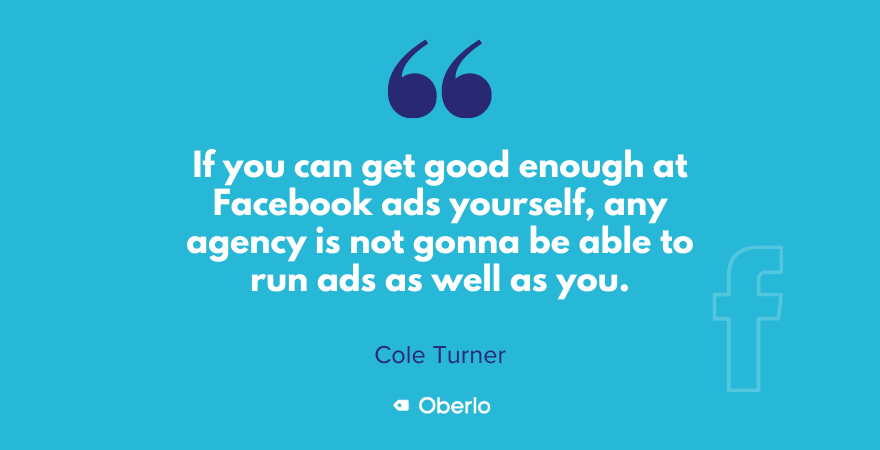
Allanah: That's a great idea, and also I think that's good, reassuring, as well, that really, if you put in the effort, you can learn just as much. Do you have certain ads that you just see outperforming, performing really well all the time, or carousel ads versus video versus picture or...?
Cole: So it really depends. For me, I've realized it doesn't necessarily matter what type of ad, it matters the message and how enticing it is to people. Like right now, I run a lot of flash sale type ads, where it's like, "Huge sale, 75% off up until this point." And those are obviously marketing, not that it's urgency and scarcity and things, it'll just get people to buy.
But nothing really stands out for me. I have video ads that do well, I have picture ads that do well, I usually use carousel for retargeting, those work well.
It doesn't matter what type as long as you make sure you have a solid message.
Setting a Budget for Ads
Allanah: So you mentioned at the beginning that you lost quite a bit of money, and I think that also is normal, even if you have a good product because you're constantly letting your Facebook Pixel grow. What was your starting budget or your testing budget per product?
Cole: When I first ever started?
Allanah: Yeah, yeah.
Cole: So I would turn off campaigns after they'd spent five dollars, and I was convinced that they weren't gonna be profitable. That's where I started.
Allanah: And what do you know now, though?
Cole: I've realized now that I need to probably spend... I usually start out with a budget of $50 per ad set and have about 10 ad sets. So I started out with probably $500 a day if I'm testing something, but I also have a whole lot of revenue.
I would say when I first started ever making money, I would probably spend $200 on a product and then turn it off.
So we'd have maybe ten different ad sets, and then maybe put about $10 per day.
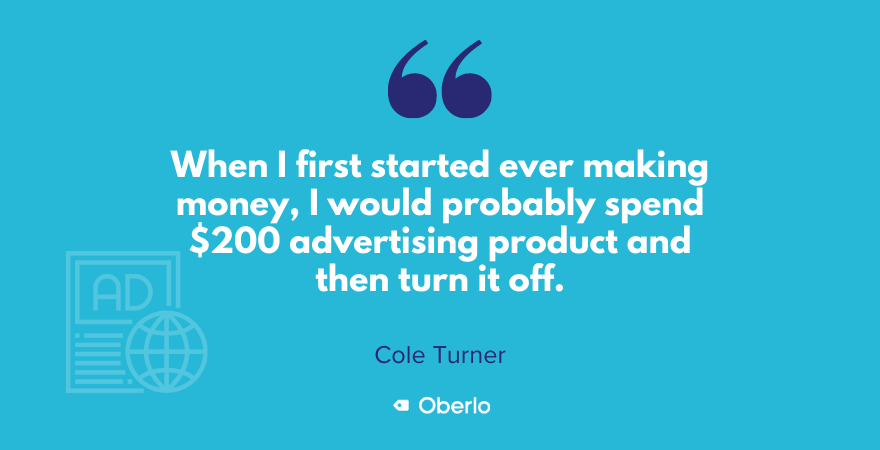
Allanah: Okay, I think that's definitely really good advice for a newbie. It's really hard to tell, I guess, when you're new and especially if you aren't so prepared to lose money, which I think you should be with dropshipping, I think that's a big myth that people maybe don't really get.
Cole: They definitely think it's get-rich-quick-type stuff.
Allanah: Yeah. Yeah. So in terms of your store now, you've had it open for over a year, you were saying?
Cole: Yeah, I believe it's just over a year.
Allanah: And would you plan to continue with it or do you want to bring out your own range or start a new store, what kind of plans do you have?
Cole: Well, it's actually what my plan for the rest of my life is gonna be, it's to start with dropshipping and then slowly transition into traditional ecommerce. So completely US fulfillment and US manufacturing, my own product lines that I have copyrighted images to that no one else can sell and custom product packaging, that's something I'm working on as well.
So moving from shipping, just letting China do whatever, to moving all that stuff over to the US. It's really hard to do that too, but I think that should be the end goal for anyone that actually wants to build a business to sell.
So I'm running this only with the goal of selling it, for multiple millions.
Finding Suppliers and Mentoring Others
Allanah: And so at the moment, are you still dropshipping using a supplier that you found kind of on AliExpress or have you...
Cole: No, I have a supplier that I've met personally. But they are in China and they're shipping times are about five and ten days.
Allanah: Oh yeah, that's fantastic. How long did it take you to find a supplier like that?
Cole: It took me quite some time. One of my friends... So I got pretty connected with people through ecommerce, and one of my ecommerce buddies showed me this supplier, and sort of my partner flew out to China and met them and I've met him indirectly through him.
Allanah: Yeah, that's a really good way, I think, of establishing a relationship when you want something to really go the long term.
So you mentioned that you're quite in with the ecommerce community. Did you get into Facebook groups or mentoring groups or something like that?
Cole: So I have mentored people before myself. I've been in all the Facebook groups, and I used to work for a company that mentored people that had 20 or 30 different coaches who were just like me, maybe not to toot my own horn but they probably weren't as good as I am but they had the same skill sets. And so I was able to collaborate and do things like that.
Allanah: And you were doing that on top of having your stores as well?
Cole: Yes I was.
Dealing With Challenges
Allanah: Nice one. So overall, with the whole journey that you've taken, what would you say the biggest challenge has been, whether it's something that happened at the start or that consistently comes up with all of the stores?
Cole: The biggest challenge is gonna be your own mind, I would say. Because I realized after I had made it this far that I could have given up at any point. And everyone gives up probably. I feel like I'm probably in the top one percentile of the people who start dropshipping 'cause I've shown it to all of my friends in real life, they've given up. Everyone else has given up.
So definitely believing that it's possible and not giving up is the biggest roadblock. 'Cause it's just like if you were to go start working out, if you work out for a week, you're not gonna get super muscular, but if you work out, and you keep working out even though it sucks and it's not fun, eventually you'll become a bodybuilder.
So you have to force yourself to keep moving and keep learning, and even when you're losing all your money on Facebook ads and you can't afford to buy food, you gotta keep that goal in the forefront of your vision.
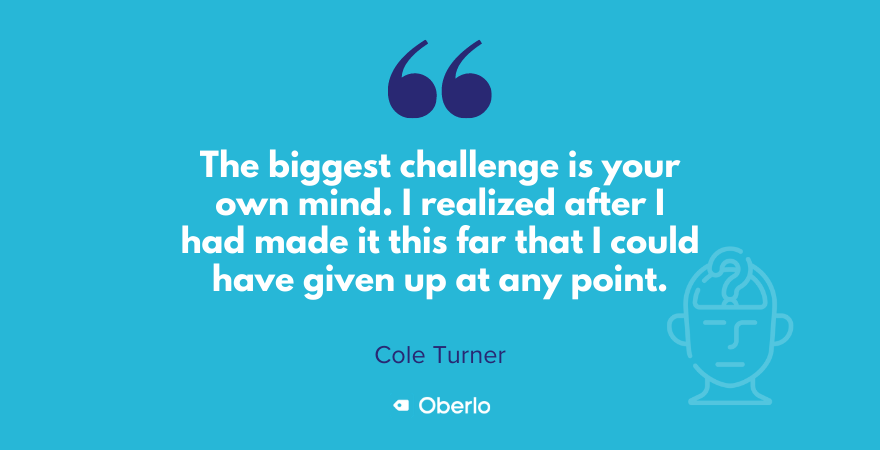
Tips for Beginner Dropshippers
Allanah: Right. Yeah, I think that's great advice. And on that thread as well, do you have any super actionable tips that you would give people starting out? Obviously, don't give up is, I think, the umbrella of everything. Do you have any things that you think people should really focus on that you see them make the mistake over again?
Cole: I would say, don't just make some website called superdealstore.com. I would say make something that looks like a real brand. So it doesn't matter if it is a real brand or not yet, come up with a name.
Like I have another store called Royanova. And I got the domain royanova.com. And I sell just general store type stuff but it looks like a real brand. So it's investing, coming up with a good name and a good logo and getting a good domain for your business, and then try to create an identity for your business too, like have a theme that's pervading.
Like if you want your website to be real sleek and elegant looking, and you wanna sell real sleek jewelry, just take some time in the beginning to make sure things look right and look good because people notice, as you said, people are very aware nowadays of what's a cheap dropshipping store from China and what's a real store.
Allanah: On that note as well, kinda interesting to ask, do you have any personal... Did you choose what worked rather than passion?
Cole: I like to just look at the numbers so I couldn't care. I just try to go where the money is.
Allanah: Yeah.
Cole: I would definitely tell people to avoid passion itself. But find what other people are passionate about and sell that.
Allanah: Okay, I mean, you can grow passion if it helps grow your money, right?
Cole: I'm passionate about money, that's the only thing I'm passionate about.
Allanah: I wanted to ask, do you have anything else that you wanted to add, maybe about like... I think the tips and tricks that you see, mistakes you see people making. Do you have any other stories about starting out? I'd love to hear that as well.
Cole: When I first started out, I didn't have a consistent stream of revenue. But I managed to get a job making $25 an hour, which for me at that time was a lot of money. I pumped all of that into my business.
So it's very important for people to understand that you're building a machine basically.
I'm an engineering major at college, so I think of everything in terms of a system. If you don't pump money into the system, you can't make it pump more money out.
And all a business is is a money multiplier, so you give it money and if it runs correctly, it gives you more money back. And so, if you can't pump money into the machine, it can't give you anything back. So they need to have a consistent stream of income, definitely if they want to be successful.
And that's one of the hardest things for people to hear because everybody's like, "Oh, I have $10. Do you think I can be successful?" And that's not it, you need thousands of dollars probably.
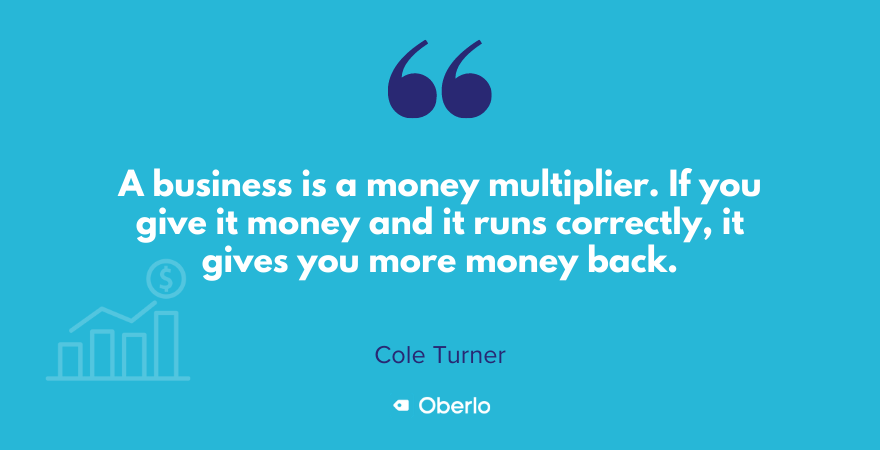
Allanah: Yeah. What was the job that you'd got working for $25 an hour?
Cole: So, there was this coaching job that I mentioned to you. That was where this guy named Tayo Banjo, who was a very successful ecommerce person. He would reach out to people that were successful in this Facebook group and ask them if they wanted to be coaches for his business.
But one of my friends got a job there and I decided to email the customer service team for the business and lie to them and say I was extremely successful and convince them to give me a job. And so I was a coach there when I had no idea what to do. I eventually just learned the way by faking it 'til I made it and then I was also making $25 an hour.
Allanah: Yeah, you're coming out winning... I mean you really did know what you were doing, right, if you were faking it.
Cole: Not at that point, yeah. I knew how to convince people I knew what I was doing, but I didn't really know what I was doing at that point.
Allanah: You're a born salesman. Cool, it was awesome to talk to you. I hope you have a lovely afternoon.
Cole: Thank you so much. Have a great day.
Allanah: Thanks.